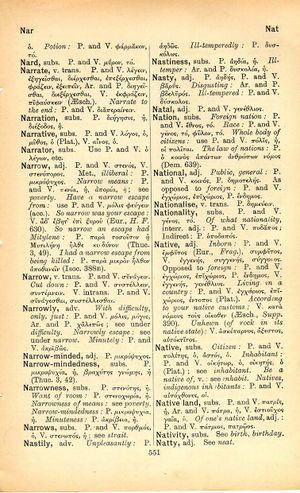narrative
έγ', ὦ ταλαίπωρ', αὐτὸς ὧν χρείᾳ πάρει. τὰ πολλὰ γάρ τοι ῥήματ' ἢ τέρψαντά τι, ἢ δυσχεράναντ', ἢ κατοικτίσαντά πως, παρέσχε φωνὴν τοῖς ἀφωνήτοις τινά → Wretched brother, tell him what you need. A multitude of words can be pleasurable, burdensome, or they can arouse pity somehow — they give a kind of voice to the voiceless | Tell him yourself, poor brother, what it is you need! For abundance of words, bringing delight or being full of annoyance or pity, can sometimes lend a voice to those who are speechless.
English > Greek (Woodhouse)
substantive
P. and V. λόγος, ὁ, μῦθος, ὁ (Plato), V. αἶνος, ὁ.
Latin > English (Lewis & Short)
narrātīvē: adv. narro,
I in the way of narration, Don. ad Ter. argum. And.
Latin > French (Gaffiot 2016)
narrātīvē (narrativus), en racontant, au moyen d’un récit : Don. Andr. Arg.
Latin > German (Georges)
nārrātīvē, Adv. (narrativus), erzählend, Donat. ad Ter. argum. Andr. vol. 1. p. 4, 29 ed. Klotz.

